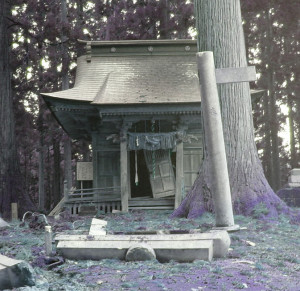A New Worry
When it looked like we couldn’t get through to southern Korea on the train, there was talk of going back north. Some, like the Manchurian Railroad people, tough Japanese engineers who lived in Manchuria for many years, thought that once the Soviets finished their rampage, the situation would be better up north than it was down here in northern Korea, surrounded by angry locals. Many of these people did go back but there were a few of us who still thought it would be better to somehow get through the 38th Parallel before they closed it down completely.
As it became clear we had to move somewhere, I cut up our blanket and made coats for Masahiro and Masahiko. The uncertain days passed into September. Our dan was ordered to leave the Agricultural School and move into an empty house on top of the hill outside town. We stuffed the bags of forty-nine people onto two ox-carts we borrowed from the school. We avoided the middle of town where we might run into Koreans eager for revenge, and instead walked around the village to the hill. But it was soon obvious that we wouldn’t be able to get the two ox-carts up the hill.
We collected our bags off the carts and carried them up. The house at the top had a small wooden sign, “Sensen samusho,” a reminder of its past life as a Japanese shinto shrine, one of many built by the occupying Japanese government. The shrine itself had been burnt down recently, perhaps by an angry mob celebrating the end of the Japanese occupation. But the residential building next door had miraculously escaped the fire. This house had Japanese tatami, rice straw mats laid inside. How nostalgic! There was nothing else inside. The thought of sleeping on comfortable tatami mats made us feel safer.
Beyond the remains of the shinto shrine, a mountain range rose into view.
In terms of size, the house contained an eight tatami mat size room, two six mat rooms, and two small four-and-a-half mat size rooms. Our group divided up into these five rooms. There was a kitchen and two toilets. Although the pump didn’t flow very well because we were at the top of a hill, if we left a bucket under the pump for the night, by morning there was a good amount of water in the bucket.
At night we saw the lights of the town below. Sometimes we even heard sounds from the town. But besides that, we had an interesting view. We saw below us everyday, open train cars going south overloaded with people. Mostly Koreans passengers, but we still wondered, “When can we go home to Japan?” As we obsessively wondered what to do, whenever we saw anyone on the trains who looked Japanese—we asked ourselves, “Has the hikiage repatriation started?”
After seeing some Japanese on the trains, my husband went to see if he could verify who and from where these Japanese might be. We felt better sleeping on tatami mats, outside of town and although we were a group of forty-nine strangers, it was refreshing to hear the sound of laughter from time to time.
We were fortunate to find a large number of futon quilts left behind by other Japanese who had already left. Many of these futon were wet and half rotted but when we dried them out, some of them could be restored back to decent shape. I took two of the quilts and used them for our bed. Around our house on the hill, wild white chrysanthemums blossomed with a few yellow ones scattered amongst them.
Our children regained their strength. Avoiding the main roads, the men went to town everyday to buy food. They bought back something that looked like hoshi-zakana dried fish and some hango, small metal pots for cooking. We cooked vegetables and fish. We bought and baked sweet potatoes, roasted corn and ate. My breasts swelled and I nursed Sakiko once again. We even talked about daily life, mundane things like, “Three ears of corn for one yen. That’s cheap…or that’s too expensive.” Using wood we picked up on the mountain, we cooked the food and felt good.
We were seventeen families, almost fifty people all together, in the five rooms. Living so close together, we had a new worry. Where to keep our money? We decided to hide our money tucked in empty cans—near the roots of trees, under rocks. Each family hid their money, not only from outsiders, but also from the other members of the dan. There had already been several thefts. My husband and I decided to divide our money into three parts, and to hide it outside and inside.
Everyone had to contribute to a pool of money to cover group expenses. It was frightening to think what would happen if someone inevitably ran out of money, and could no longer contribute their share. I wondered, “Would the rest of the dan look after the impoverished members?” I tried not to think of that. For now, we depended on the money from Manchuria. Later, we might go our separate ways but for now, we had to live together.
Once every ten days, we withdrew our Manchurian money and exchanged it for Korean bank certificates. One hundred yen became fifty yen. Japanese money was no longer accepted and we were running out of funds. The men went out to work everyday, doing anything to earn a little money. My husband got up early and come back late, exhausted after a full day of manual labor, but all I could offer him at the end of the day was one ear of corn or maybe an apple.
